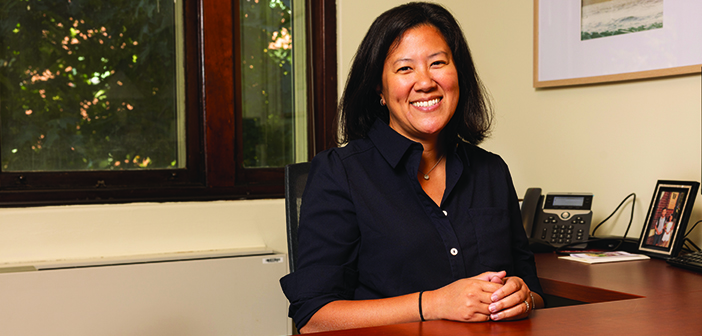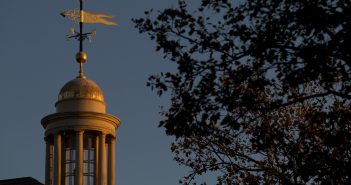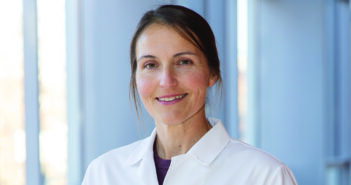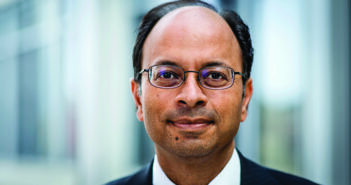Judy Jang came to Brown as a PLME student. Now she leads the program.
As the daughter of immigrants whose father practiced medicine in a small Pennsylvania coal-mining town, Judy Jang ’03 MD’07 knew from an early age that she wanted to be a doctor—but she also loved visual arts and was interested in economics. She chose Brown’s Program in Liberal Medical Education so she could “do all of it,” she says.
After medical school, Jang completed an internal medicine residency and a nephrology fellowship at Washington University School of Medicine and joined their faculty. She returned to Brown in 2016 as an assistant dean of medicine, PLME advising, and assistant professor of medicine, and to practice nephrology in Fall River, MA.
Jang is well-loved even by PLMEs beyond her advisee cohort, and we celebrated when she was appointed associate dean for the program in February. My opportunity to talk to her and ask her about her own experience as a PLME felt as though I was talking to a classmate in the future—the PLME experience transcends time. Hearing her reminisce on her time as a student and her plans to shape the experiences of PLMEs as a dean has made it clear and apparent the pride, the history, the care, and the love that Jang has and will continue to pour into this program for classes to come.
How does it feel to go from being a PLME student to being dean?
It feels very surreal, to be honest. It’s incredible. It’s obviously not something you think about when you’re a PLME student. A lot of my thoughts are rooted in the tremendous investment that the PLME and its mentors have placed in me – into all of us. I feel very lucky to have this opportunity and to follow in the footsteps of one of my mentors, [Julianne] Ip [’75 MD’78 RES’81, P’18, the inaugural PLME dean].
Did PLME impact the way you are practicing as a doctor today?
Definitely. I think being afforded the opportunity to go after your passions changes you as a person—it just makes you a more holistic and humanistic physician.
PLME has changed my path and that of many of my classmates. It offers you such a different perspective of medicine early on. And even if you do something that’s completely unrelated to medicine while you’re in undergrad, when you come back to medicine, it gives you a greater appreciation of it.
Why medicine? How did you know at 17 when you committed to PLME?
I always knew that I wanted to do medicine. I grew up in a very small community, a coal-mining town in Northeastern Pennsylvania. My dad was a small-town ENT [ear, nose, and throat] doctor. I never really shadowed him but was in and out of his office. Out in the community, patients would come up to us telling us they were grateful for his care. I felt the impact that he made in his own way. He was kind and took the time to listen to his patients, never turning any of them away, even those who could not pay. I always knew I wanted to give back in that sense and be a doctor.
In terms of the PLME itself, it’s really the only program that encourages you to expand the breadth of your liberal arts education while pursuing a career in medicine. I had many other interests—I loved art. I was interested in the intersection between medicine and economics. That’s why I chose Brown, because it gave me the opportunity to do all of that.
What’s your medium?
I like to draw—pencil and charcoal.
What “non-medicine-related” experiences change your perspective in undergrad?
I really tried to take advantage of the Open Curriculum. For first-year students, I remember there were two PLME courses I was deciding between, Hard Choices and Costs vs. Care, taught by my adviser, Stephen Smith [MD, MPH, professor emeritus of medicine]. You could only choose one. Because I was interested in the business and economics side of medicine, I chose to take Cost vs. Care, but always wished that I could have also taken Hard Choices with Ed Beiser [PhD, JD, late professor of political science and associate dean of Brown Medical School].
I also explored quite a few of the visual arts classes. Most of my closest friends did non-STEM concentrations, so we were always trading classes back and forth. With my economics background, I’m grateful I had the opportunity to intern at Oxford Health Plans one summer, and also spent time in Taiwan at the US Embassy there, the American Institute in Taiwan. Because of the PLME, I felt encouraged to explore these non-medicine-related opportunities, and as a physician, I feel they have enriched my life.
How has the program changed since you were a PLME?
When you have an excellent foundation, the good news is that a lot does not need to change. So I was happy to see the opposite—that many things have stayed the same. The commitment and investment of the advising team have always been present, and strongly student focused. A lot of the staple programs have not changed, like Whole Patient Program. But that’s not to say that there isn’t room for growth. I do think that as we move forward, there is opportunity to bring in new curricula. Student experiences in the clinical setting, for instance, can start much earlier. Having more panels about physicians and their experiences, both within and outside of medicine, show students that even though you are a physician, that’s only one part of your identity.
What might the PLME look like under your direction in, say, 10 years?
Each of us serves as the legacy of those who have come before us, and the PLME that was built is amazing. I have heard so many students of today and classmates of yesterday say that if it weren’t for the PLME, they would not have become doctors. My general sense is to continue to encourage students who may not have the opportunity—or may not necessarily know all the ins and outs of the medical field—to really find their passion within medicine. Short term and long term, that would be one of my biggest goals. That’s always been the ethos of the program in terms of encouraging students to be the best whole physician that they can be.
But the PLME also offers us a unique opportunity to start the training of becoming a physician earlier. We have the unique ability to supersede the barriers between undergraduate and medical education, so we can start training our future doctors today and not tomorrow. I look forward to introducing other ways for students to explore medicine. We’re thinking of revamping Medicine in Action. For example, [Liza] Aguiar [’04 MD’08 RES’13, assistant dean, PLME advising] has suggested having students go in robotics simulation labs to give students exposure and experience. She also holds the PLME suturing workshop. I think the goal is just being creative in the ways we present this message to students while still maintaining that foundation.
Why are programs like PLME so important for aspiring physicians?
There are so many talented students out there, and we have many of them who come from different backgrounds, different places, with different circumstances. Our goal is to offer this opportunity to students who possess a drive and a passion to become physicians but may not necessarily have the resources or knowledge to optimally negotiate that path.
The PLME has always been a little different from other traditional MD-baccalaureate programs in its non-accelerated nature. It has a core set of requirements, but beyond that, you’re a Brown student and you’re encouraged to explore the Open Curriculum, another unique Brown offering. We encourage you to expand your horizons. We want you to take risks and to learn from your mistakes. There are opportunities for you to go abroad in the summer through the PLME. You have your whole lives ahead of you to pursue medicine, but this is really your one chance in college to take advantage of all these opportunities and choices to help make you the person that you want to become. Having that different bend and approach to your education makes your journey different than the masses who had to follow standard pre-med requirements—it’s a different path and, in my opinion, a better one.
I believe in the program. I’m a product of the program. It’s a unique privilege to be given the freedom of exploration in undergrad while still getting a taste of medicine and knowing that it is what you ultimately want to do.
What characteristic unites PLMEs across the classes?
Passion. Every student who comes through the PLME is passionate about something. That’s really the draw when we’re reading applications: what is the student really passionate about?
And not just within medicine, but outside of medicine. Whether it’s CS [computer science]or visual arts or classics, or something new that they discovered at Brown, what makes you spark?
I think that’s what sort of drives all of us, both alumni and current students, to do better and to find a better version of yourself by exploring your passions.
In an increasingly technological world, why is a liberal medical education so important?
When we meet students during orientation, they usually have a whole list of classes that they’ve written down from Courses at Brown and want to take during their four years at Brown.
As they become juniors and seniors, courseloads may become very full of, say, neuroscience, or CS, or any one topic. I really challenge them to go back and find that list and see if there are other classes at Brown that they wanted to take. When we do that, they are reminded of why PLME was important in the first place, and many students end up changing their courseload.
You have your whole lives ahead of you to gain a lot of knowledge in tech and medicine and their intersection. But this is really your one change in life where you have all these opportunities and choices to make. I just tell students, when you look back at your time at Brown, I don’t want you to regret that didn’t take that one course by that one really great professor.
What is your favorite memory as a PLME?
Oh, gosh. There are so many.
I would say it’s probably the time that I spent with my friends. Most of my closest friends and I went to a pre-orientation program, TWTP, the Third World Transition Program. It just so happened that a few of us clicked, and we happened to be PLMEs. We hung out all the time. Many of my friends had non-STEM concentrations, so we were together for our PLME requirements. It was really fun to take that journey with them. And though we have different paths now, we’ve stuck together and grown up together.
And then the mentorship. I cannot stress enough on how that’s really been instrumental to me in my life and in my career—how we were trusted in the PLME to create our own educational path. It’s pretty amazing that we were able to do that, and we were encouraged to do that.
I had a great time in college and in medical school. I enjoyed my time a lot at Brown. I don’t think my husband and I ever thought we would come back to Brown, but it’s been a great ride since we’ve been back.
What’s the best part of your job?
The students. Getting to know all of you is the best part, hands down. As a student, I was so bonded to the program. I felt so supported as a student, so I love meeting with students and giving back some of what was invested in me—I love hearing their passions and their interests.
The other part of it is working with the amazing team that we’ve built. Remember: we helped to choose you. We are invested in you and we want to see you succeed. We all have a common goal to see you become the best possible physicians that you can be. So this really isn’t a job for us—it’s a passion project.
Gabriella Lui is a junior in the PLME, concentrating in applied math-biology and anthropology.




